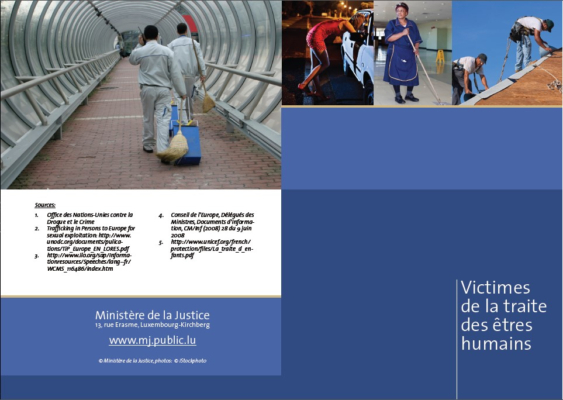 Credit: MJ
Credit: MJ
On Friday 25 March 2022, Luxembourg's Ministry of Justice, the Ministry of Foreign and European Affairs and the Ministry of Family Affairs, Integration and the Greater Region called for awareness and vigilance on the risks faced by people fleeing the war in Ukraine becoming victims of exploitation and human trafficking.
As a result of the continued war in Ukraine, many people continue to flee their country to other European countries, including Luxembourg. Most of them are women, children and elderly people, often lacking financial and material resources.
Countries bordering Ukraine have already reported attempts of exploitation and trafficking, including through fraudulent travel arrangements or offers of accommodation in return for household or childcare services to be performed for the host.
The ministries stressed that these reports are taken very seriously and Member States, as well as all European institutions, acknowledge the risk of human trafficking in the current context.
Even in the absence of malicious intent, a situation of exploitation or even trafficking can develop over time. As such, the Ministry stated that these phenomena require increased vigilance on the part of the population in order to avoid situations of labour exploitation, where victims find themselves without a contract, remuneration and any social protection.
Under Luxembourg law, human trafficking, which is a modern form of slavery, is determined by two elements: an action (recruitment, transportation, transfer, harbouring or reception of a person or the handing over or transfer of control over that person) being committed with the aim of exploiting that person. Often, the perpetrators threaten or use force, violence or other forms of coercion.
Trafficking in persons can take different forms:
- Sexual exploitation: victims are forced into prostitution and the perpetrator makes an illicit profit.
- Labour exploitation: victims are forced to work in conditions contrary to human dignity, without (adequate) remuneration. Sectors at high risk are construction, agriculture, hospitality and domestic work (personal assistance and childcare).
- Coercion to commit offences and crimes: victims are forced to commit an illegal activity under duress, for example transporting drugs or stealing.
The inter-ministerial Monitoring Committee on the fight against human trafficking, chaired by the Ministry of Justice, recalled that human trafficking is a serious violation of human rights, whose various forms range from sexual exploitation, child trafficking, forced labour and domestic slavery to coercion to commit crimes.
In this context, the committee took preventive measures with the other actors involved. The National Reception Office (Office national de l'accueil - ONA) and its partners Caritas and the Red Cross are systematically raising awareness of human trafficking and are distributing leaflets aimed at informing potential victims of their rights, including where to go for help and protection, in a language they understand. Regular updates of the information is planned, as well as a translation of the available data into Ukrainian.
This information is further detailed on the website www.stoptraite.lu and the Facebook page "stoptraite.lu", as well as the website of the Ministry of Justice at https://mj.gouvernement.lu/fr/dossiers/2020/lutte-traite-humains.html.
The website of the Ministry of Foreign and European Affairs has a section with useful information on and for people fleeing the armed conflict in Ukraine at https://maee.gouvernement.lu/en/services-aux-citoyens/accueil-de-personnes-ukraine.html.
An information booklet on labour law enabling those concerned to know their rights and thus reduce the risk of exploitation which is detailed by the Ministry of Labour, Employment and the Social and Solidarity Economy, the Inspectorate of Labour and Mines (ITM) and the National Employment Agency (ADEM) can be found online at: https://adem.public.lu/en/actualites/adem/2022/03/ukraine-info.html and https://itm.public.lu/fr/actualites/focus/2022/03/travailler-luxembourg.html.
Any reports of trafficking or exploitation can be made to Judicial Police Service, Fugitive Search and Victim Protection Unit via tel: 113 (24h/24) or email: traite@police.etat.lu and Infotraite support services via tel: 2736-5646, 621-351884 or 621-316919 or via email: info@traite.lu.








